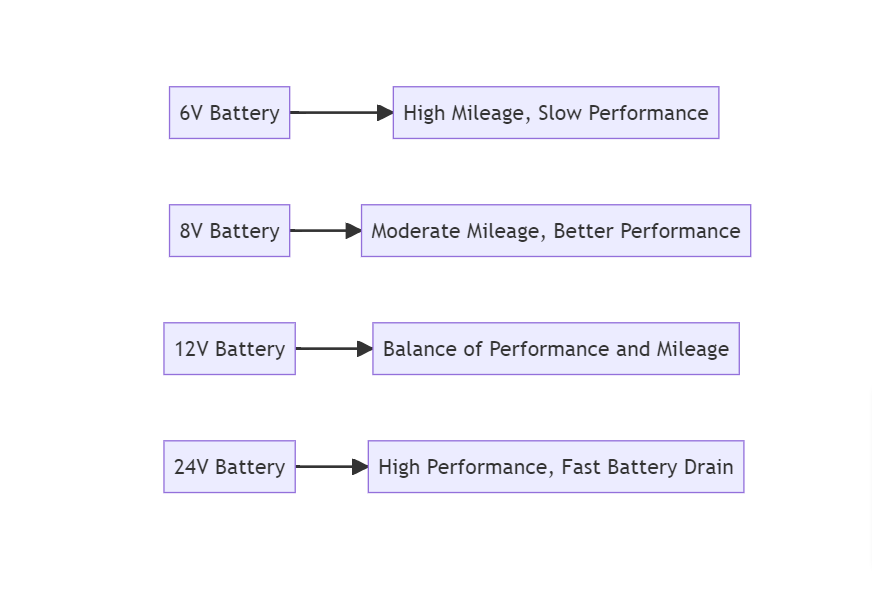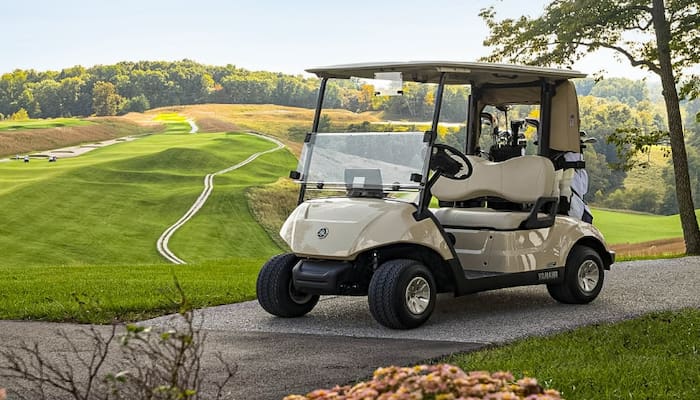Last updated on July 28th, 2023 at 05:52 pm
Yamaha Drive Gas Golf Carts are a popular choice for many, offering a convenient mode of transportation around neighborhoods and golf courses. However, a common question that arises among users is about the appropriate battery size for these carts.
In this blog post, we will aims to provide a comprehensive understanding of the battery size requirements for Yamaha Drive Gas Golf Carts, along with detailed insights into the different battery options available.
Table of Article Contents
Understanding Yamaha Drive Gas Golf Cart Battery Size
The battery size for your Yamaha Drive Gas Golf Cart largely depends on the model year of your cart. While the standard size is 12 Volts, it’s essential to note that electric and gas golf cart batteries have different potentials, meaning the same battery cannot be used in both.
Most gas golf carts use batteries between 12 and 16 Volts, with Yamaha Drive Gas Golf Carts specifically requiring 12 Volts batteries for operation. To match the output power of at least 1800 Amps at 48 Volts, you will need four 12 Volts batteries, each delivering a maximum of 600 Amps.
Yamaha Drive (Gas) Golf Cart Batteries Voltage
Yamaha Drive Gas Golf Cart comes in two models, one designed for 36 Volts and the other for 48 Volts. Both models have the same battery capacity, with a maximum of six 8 Volts batteries.
Related Guide - 36 Volt Ezgo Golf Cart
However, if you’re using a 12-volt battery, you’ll need four for the 48V models and three for the 36V models. Despite this, it’s not recommended to use 8-volt batteries; the ideal size is 12-volt batteries.
Why Choose 12 Volt Battery?
Durability and extended usage are key considerations when choosing a battery. Compared to 6V or 8V batteries, a 12 Volt battery has the most moderate amperage. A 24V battery, on the other hand, might discharge faster due to its higher amperage.
Additionally, 12 Volt batteries have slightly smaller dimensions, making them easier to handle during replacement. They also have six lids, compared to the three or four caps found on other batteries.
Compatible Batteries for Yamaha Drive Gas Golf Cart
The Yamaha Drive Gas Golf Cart is compatible with almost every battery, as long as it matches the voltage and power delivery.
Some recommended battery options include:
- Trojan T875 8V / T-105 6V: These are two of the most popular golf cart batteries on the market. The T875 is an 8-volt battery, while the T-105 is a 6-volt battery. They both have high amp-hour ratings, so they can provide a lot of power for a long period of time.
Related Guide - Trojan Golf Cart Batteries
- Yamaha G22 Lithium: This is a lithium-ion battery that is designed specifically for Yamaha golf carts. It is lighter and more powerful than traditional lead-acid batteries, and it has a longer lifespan.
- Motive T-875: This is another popular 12-volt, deep-cycle battery for golf carts. It is slightly smaller than the Trojan T-1275, but it still has a high amp-hour rating.
- UPG UB12350 U1 12V: This is a 12-volt battery that is designed for high-performance applications. It has a high amp-hour rating, so it can provide a lot of power for a long period of time.
- VMax ML35 12V: This is a 12-volt battery that is known for its long lifespan. It has a lower amp-hour rating than some of the other batteries on this list, but it will still provide plenty of power for most golf carts.
- Lifeline GPL 8DL 12V: This is a 12-volt battery that is designed for deep-cycle applications. It has a high amp-hour rating, so it can provide a lot of power for a long period of time.
- ExtraPower 12V: This is a 12-volt battery that is known for its affordability. It has a lower amp-hour rating than some of the other batteries on this list, but it will still provide plenty of power for most golf carts.
The Yamaha Drive Gas Golf Cart is a 48-volt cart, so you will need four 12-volt batteries. You can use any combination of the batteries listed above, as long as you have a total of 48 volts.
Ultimately, the best battery for you will depend on your individual needs and budget. If you need a battery with a high amp-hour rating and a long lifespan, the Trojan T875 8V / T-105 6V or the UPG UB12350 U1 12V are good options. If you are on a budget, the ExtraPower or the Motive T-875 12V is a good choice.
Some Tips for choosing golf cart batteries:
- Consider the voltage of your golf cart: As mentioned above, the Yamaha Drive Gas Golf Cart is a 48-volt cart. Make sure to choose batteries that have the same voltage.
- Consider the amp-hour rating of the batteries: The amp-hour rating is a measure of how much power the battery can provide. A higher amp-hour rating means that the battery can provide more power for a longer period of time.
- Consider the type of battery: There are two main types of golf cart batteries: lead-acid batteries and lithium-ion batteries. Lead-acid batteries are less expensive, but they have a shorter lifespan. Lithium-ion batteries are more expensive, but they have a longer lifespan and are lighter weight.
Importance of Correct Battery Size
Choosing the correct battery size for your Yamaha Drive Gas Golf Cart is crucial. Lower voltage can affect performance, while higher voltage can drain the battery faster. Therefore, the battery capacity should be moderate to maintain balanced performance, which will help your Yamaha Drive (GAS) Golf Cart’s battery last longer.
Battery Facts: 6V, 8V, 12V, and 24V
Different voltage batteries have different characteristics and are suitable for different use cases.
Here’s a quick rundown:

- 6V Battery: Provides the highest mileage due to slower battery drain. Requires eight 6 Volt batteries.
- 8V Battery: Offers slightly better acceleration than 6 Volt batteries but drains faster. Requires six 8 Volt batteries.
- 12V Battery: Provides a balance between performance and mileage. Most suitable for regular users.
- 24V Battery: Not recommended for Yamaha Drive Gas Golf Cart unless used for fast-paced work. Drains battery faster and has a shorter lifespan.
Choosing Between Flooded Lead Acid (FLA) and Sealed Lead Acid (SLA) Batteries
The type of battery that you choose is also important. There are two main types of golf cart batteries:
- flooded lead acid (FLA) batteries
- sealed lead acid (SLA) batteries.
FLA batteries are the most common type of golf cart battery. They are relatively inexpensive and easy to find. However, FLA batteries require regular maintenance, such as adding water.
Conversely, SLA batteries might be a bit costlier than FLA batteries, but they offer the advantage of being maintenance-free. Moreover, SLA batteries demonstrate increased resilience towards vibration and fluctuations in temperature.
Choosing the right battery for your needs
Choosing the right battery for your Yamaha Drive gas golf cart extends beyond size and type. Additional considerations such as climate, terrain, and weight of the cart and its occupants can influence battery performance.
- Climate: If you live in a colder region, opt for a battery designed to withstand low temperatures.
If you live in a cold climate, you will need a battery with a higher CCA rating.
- Terrain: For rough terrains, a battery resistant to vibrations is ideal.
- Amp-hour rating: The amp-hour rating of your battery determines how long it will last on a single charge. A higher amp-hour rating means that the battery will last longer.
- Cart’s weight: Heavier carts require batteries with higher Ah ratings for optimum performance.
- Cold cranking amps: The cold cranking amps (CCA) rating of your battery determines how well it will start your golf cart in cold weather. A higher CCA rating means that the battery will start your golf cart more easily in cold weather.
- Warranty: Most battery manufacturers offer a warranty on their batteries. The length of the warranty will vary depending on the manufacturer.
Consequences of Using the Wrong Battery
Using the wrong-sized battery won’t damage your Yamaha Gas Golf Cart, but it will affect the battery’s health and performance.
Lower voltage batteries will result in slower performance and faster battery drain, while higher voltage batteries will provide more performance but at a higher power consumption cost. Additionally, repair and maintenance are easier on 12V batteries.
Some Tips to ensure your battery lasts for years to come
- Choose the right battery for your needs: Not all batteries are created equal. Some batteries are designed for deep-cycle use, while others are designed for starting only. Make sure you choose a battery that is designed for the type of use you will be giving it.
- Keep your battery clean: Dirt and grime can build up on the battery terminals and cause corrosion. This can reduce the battery’s lifespan. Clean the terminals regularly with a wire brush and baking soda solution.
- Charge your battery regularly: A fully charged battery will last longer than a battery that is only partially charged. Make sure you charge your battery at least once a month, even if you are not using it regularly.
- Store your battery in a cool, dry place: Extreme temperatures can shorten the lifespan of a battery. Store your battery in a cool, dry place when you are not using it.
- Avoid deep discharges: Deep discharges can damage the battery’s cells. If you need to discharge your battery, do so gradually.
- Replace your battery when it is time: Batteries have a limited lifespan. When your battery starts to show signs of age, it is time to replace it.
By considering all of these factors, you can choose the right battery for your Yamaha gas golf cart and ensure that it performs at its best for years to come.
FAQs
How to Determine the Needed Battery for a Yamaha Drive Gas Golf Cart?
You can determine the battery size or type for your Yamaha Gas Golf Cart in several ways. You can consult a local expert or refer to the manual that comes with your Gas Golf Cart.
How Many Batteries are in a Yamaha Drive Golf Cart?
The Yamaha Drive Gas Golf Cart doesn’t have a specific number for battery space. The maximum capacity is eight 6 Volt batteries. Usually, two 12V batteries are sufficient.
How Long do Yamaha Drive Golf Cart Batteries Last?
The duration will depend on the output power of your battery. But the average mileage is 12-35 miles depending on your Yamaha Drive Golf Cart’s battery efficiency.
Is a Yamaha Drive Battery the Same as a Car Battery?
Only 12V batteries are the same as car batteries. Cars require more power than a Gas Golf Cart. You can use a lower voltage battery on a Yamaha Drive Golf Cart, but you can’t use a lower than 12V battery on a car.
How Much Does a Battery for a Yamaha Drive Golf Cart Cost?
Regular tier batteries for Yamaha Drive Golf Cart cost around $45 to $80, depending on the voltage. Premium batteries like Duracell 12V cost about $140.
Do You Have to Use Distilled Water in Yamaha Drive Golf Cart Batteries?
Although tap water works just as well, it is advised to use distilled water if available. Normal water can contain bacteria that are not good for your Yamaha Golf Cart’s battery.
How do climate, terrain, and the weight of the cart affect the choice of battery for my Yamaha gas golf cart?
If you live in a cold climate, you need a battery with a higher Cold Cranking Amps (CCA) rating. For rough terrains, opt for a battery resistant to vibrations.
Heavier carts require batteries with higher Ah ratings for optimum performance.
Conclusion:
When replacing or adding new batteries to your Yamaha Drive Gas Golf Cart, it’s crucial to be aware of the size (volt and amps). The essential thing is to match the voltage and amps according to your Yamaha Drive Model. While the 12 Volt battery is suggested for its balance of performance and mileage, you can configure it according to your specific needs.
Samantha Green is a golf expert who helps golfers improve their game by giving advice and suggestions on accessories.


